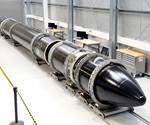Rocket Lab Electron rocket missions slated for late 2018
Rocket Lab’s It’s Business Time mission will launch in November, with the ELaNa XIX mission for NASA to follow soon after in December.
Rocket Lab (Huntington Beach, CA, US), a US orbital launch provider for the small satellite industry, has confirmed it will launch two Electron rockets just weeks apart in late 2018.
Rocket Lab’s It’s Business Time mission will launch in November, with the ELaNa XIX mission for NASA to follow soon after in December. Both missions will launch from Rocket Lab’s private orbital launch pad in New Zealand, Launch Complex-1.
Rocket Lab founder and CEO, Peter Beck, says the speedy turnaround between launches is possible thanks to designing the Electron rocket, which features carbon fiber composite casings, for rapid manufacture, as well as Launch Complex-1’s ability to process and launch vehicles quickly.
“This year our team focused on scaling up production to churn out Electron rockets at a rate of one per month. Now that we’re hitting that production rate, we’re working to get them launched at the same frequency by the end of this year, and increasing cadence into 2019,” says Beck. “It’s an incredibly exciting time for the small satellite industry. Everyone on the planet will benefit from easier access to orbit in terms of innovation, research and exploration, and we’re excited to be the team enabling that.”
Rocket Lab stood down from an earlier launch window for It’s Business Time in June 2018, after unusual behavior was identified in a motor controller during pre-launch operations. Following analysis, the motor controllers have been modified and undergone new qualification testing ahead of the next launch.
It’s Business Time’s manifest includes IRVINE01, an educational payload from the Irvine CubeSat STEM Program (Irvine, CA, US), and NABEO, a drag sail technology demonstrator designed and built by High Performance Space Structure Systems GmBH (München, Germany) and manifested as a hosted payload with support from Ecliptic Enterprises Corporation (Pasadena, CA. US). Spire Global (San Francisco, CA, US) also has two Lemur-2 satellites on board, and a GeoOptics Inc. satellite, built by Tyvak Nano-Satellite Systems (Irvine, CA, US), rounds out the mission.
After It’s Business Time, the next Electron off the pad will be NASA’s 19th Educational Launch of Nanosatellites mission, or ELaNa-XIX. The launch is manifested with innovative research and development payloads from NASA (Washington, DC, US) and educational institutions that will conduct a wide variety of new, on-orbit science. Applications of the CubeSats booked on the mission include research such as measuring radiation in the Van Allen belts to understand their impact on spacecraft, through to monitoring space weather. The mission is also NASA’s first ever Venture Class Launch Services (VCLS) mission, constituting the smallest class of dedicated launch services used by NASA. It marks a significant milestone for Rocket Lab in providing such access to space for a NASA-sponsored mission of small satellites.
Related Content
-
Materials & Processes: Fabrication methods
There are numerous methods for fabricating composite components. Selection of a method for a particular part, therefore, will depend on the materials, the part design and end-use or application. Here's a guide to selection.
-
Plant tour: Spirit AeroSystems, Belfast, Northern Ireland, U.K.
Purpose-built facility employs resin transfer infusion (RTI) and assembly technology to manufacture today’s composite A220 wings, and prepares for future new programs and production ramp-ups.
-
A new era for ceramic matrix composites
CMC is expanding, with new fiber production in Europe, faster processes and higher temperature materials enabling applications for industry, hypersonics and New Space.

.png;width=70;height=70;mode=crop)














